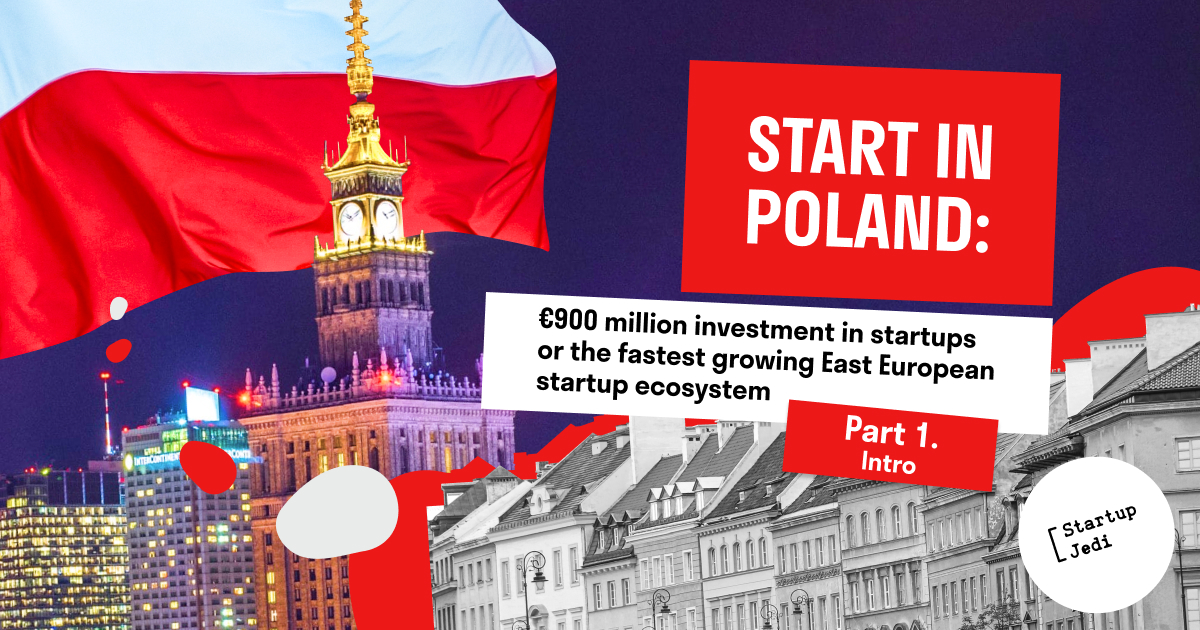
Startup Jedi
We talk to startups and investors, you get the value.
Scaling startups, developing and launching a business in foreign markets is associated with the search for the most promising and actively growing region. The START IN POLAND series of articles will describe the fastest growing startup ecosystem in the Eastern European Region: from investment opportunities and tax incentives to successful startups and industry hubs.

Startup Jedi
We talk to startups and investors, you get the value.
Poland is a promising place for business development on an international scale. There are many geographic, social, macroeconomic and investment factors that speak in favor of choosing this region.
Poland ranks 2nd in Central and Eastern Europe in terms of the volume of invested venture capital. It also ranks first by a wide margin in terms of quantity, mainly due to a significant increase in the number of Seed rounds over the past year.
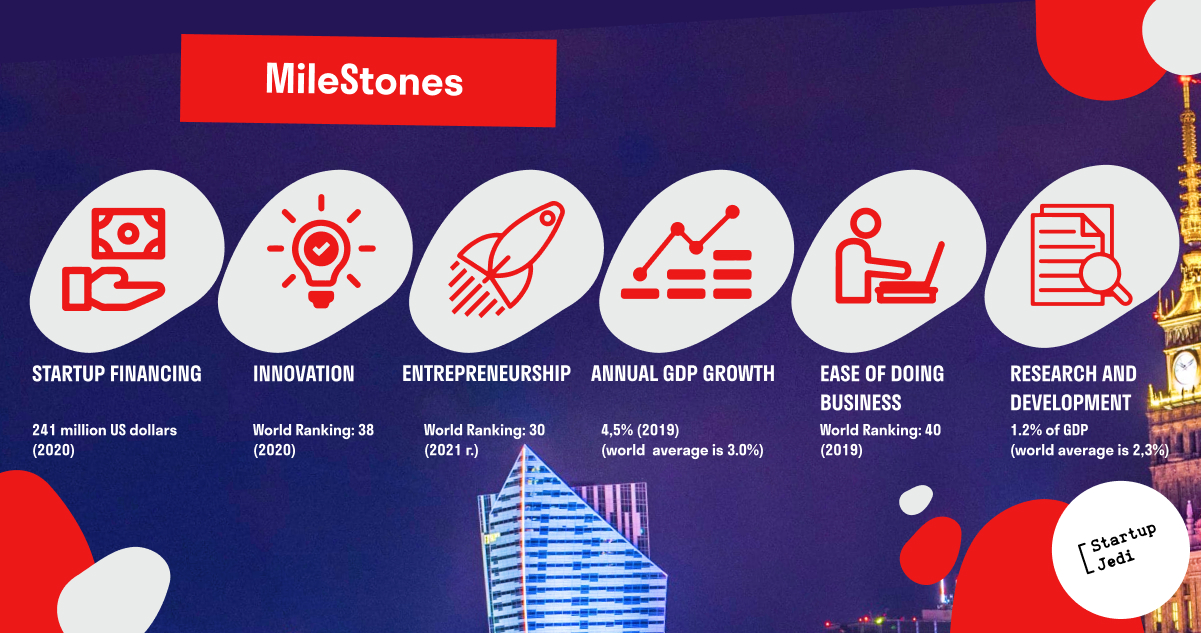
...

Poland is one of the few European countries that managed to maintain a relatively good economic situation during the pandemic. The decline in GDP is lower than the average for the European Union (2.7% in 2020). Likewise, data on other indicators such as inflation or unemployment rates look optimistic. According to economic forecasts, the economy will recover by 3.7% in 2021 (due to the pandemic) and grow by 4.7% in 2022.
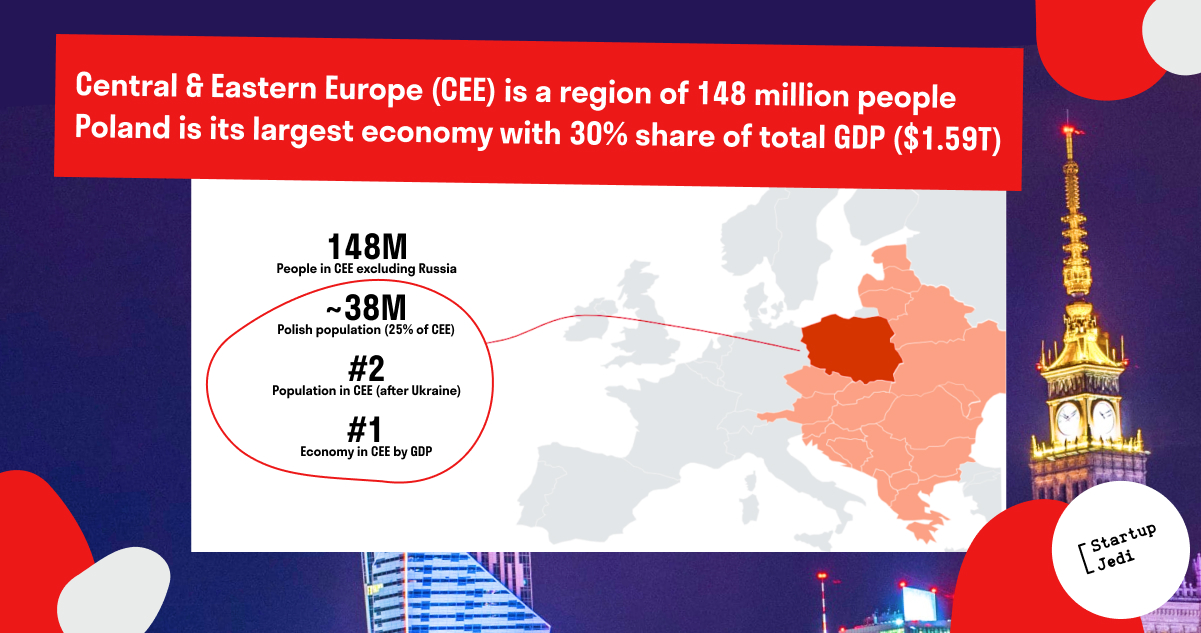
...

The number of foreign companies registering their business in Poland is growing every year. According to the “Investment Attractiveness of Europe — 2019” report, Poland was the 7th most attractive destination for foreign direct investment in Europe after France, Great Britain, Germany, Spain, Belgium and the Netherlands.
Companies investing in Poland can count on government support and non-government initiatives that make it easy to start a business. One of the systemic government incentives is, for example, exemption from income tax (depending on location, up to 70% of investment costs or two-year employment costs) for companies making new investments on both public and private lands. Besides, you can take advantage of tax incentives for research and development work, which makes it possible to double the tax base for certain expenses.

One of the most important reasons for choosing Poland is its location right in the center of Europe. For logistic reasons, the location of companies in Poland is an excellent choice for those who plan to export their products both to the East and to the West.
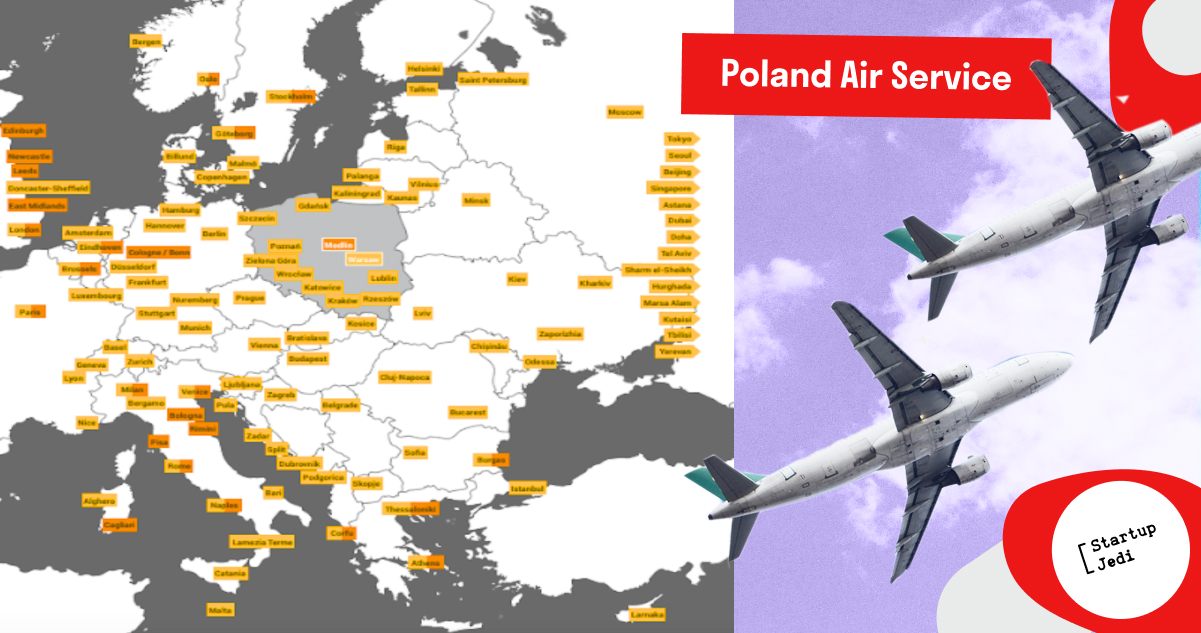
An additional advantage is the rather large domestic market. As the largest country in Central and Eastern Europe and the 6th most populous in Europe, Poland has 38 million potential consumers and provides access to the European Union market of 500 million consumers.

Compared to other European countries, the cost of living in Poland is relatively low. For example, according to Deutsche Bank’s World Price Mapping Report 2019, Warsaw ranks 12th in terms of the lowest cost of living. Berlin ranks 27th, Brussels 36th, London 47th, Madrid 24th, and New York City 53rd.
The cost of renting an apartment in Warsaw is 75% lower than in New York. Average monthly rent in Warsaw is about 3,000 zlotys (€ 640) for a studio apartment in the city center and 2,200 zlotys (€ 480) for a one-room apartment outside the center.
Annual studying costs in private higher education institutions, depending on the specific university and the course program, range from 8,000 to 10,000 zlotys (€ 1,750 — € 2,200). For example, an IT course program will cost around PLN 6,000–10,000 (€ 1,300 — € 2,200), while studying law can cost between PLN 5,000 and 12,000 (€ 1,100 — € 2,600).

Warsaw and Poland as a whole is open to various business initiatives, aimed at developing the city and its inhabitants. Let’s look at some notable trends here. The fastest growing business sectors in Warsaw currently include Business Process Outsourcing (BPO), Research and Development (R&D) and of course IT. The city authorities have recognized this trend and have been continuously working to raise new investments in the industry for several years.
The number of new IT companies is growing, as is the number of foreign companies opening their branches in the capital and throughout Poland. According to an ITT community survey conducted in 2021 by Bulldogjob, the Mazovian Voivodeship has the largest number of IT professionals in Poland (26%). In turn, according to the report on the IT work in Poland for the 1st half of 2020, prepared by No Fluff Jobs, IT specialists could count on the highest earnings in Warsaw, with salaries ranging from PLN 10,000 to PLN 19,000 per month, depending on type of agreement.

Taking into account that Warsaw is constantly developing as an attractive country for investors, the city authorities conducted a study of the economic potential of the Warsaw agglomeration. As a result, they selected key promising economic areas that will support industries able to generate competitive products for the European and global markets. Moreover, an agenda has been formed to attract talent and create an economic brand for the Warsaw agglomeration, as well as position it in relation to other city centers.
The most important economic sectors include innovative business services, green municipal governance, including circular and sharing economy, agriculture and food industry, including products produced using biotechnology and taking into account the assumptions of bioeconomy, as well as the start-up support center for the Eastern Europe region.
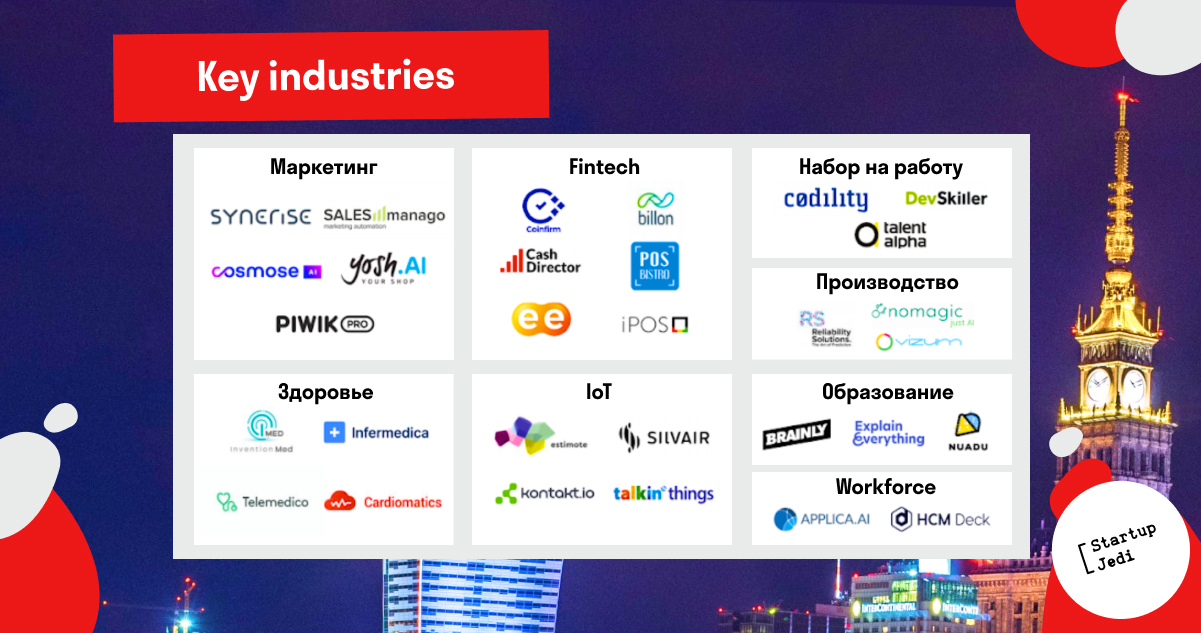
The Polish startup ecosystem with more than 3,000 startups, over 300 coworking spaces and over 130 venture capitalists, many accelerators, incubators and conferences is the most developed country in Central and Eastern Europe. This is a great place to start a business expanding to other markets in the European Union. Polish corporations and international players operating in this market actively cooperate with startups and many of them have their own accelerators, some have established corporate venture capital funds.

The development of AI is a global trend and more and more startups in Poland are introducing AI components into their products. This trend, combined with world-class developer capabilities, makes the market attractive to startups.
Thus, AI Poland is an initiative of Digital Poland fund, that aims at promoting the Polish AIr ecosystem and ensuring cooperation between Polish and foreign organizations in various fields, including business cooperation, joint development of new initiatives and investing in startups.

Warsaw ranks 45th among the major financial centers in the world and 12th in Europe. It is a leading financial center in Central and Eastern Europe.
The number of fintech-focused startups is growing every year. The Polish banking system (both public and private) has been ready for innovation for many years, which, together with the implementation of European directives, opens up opportunities for start-ups operating in this sector.
FinTech Poland | Fundacja na rzecz Innowacji Finansowych ecosystem is a professional network of partnerships that brings together startups and entrepreneurs of the FinTech sector with world experts, organizations and government agencies for cooperation in the development and promotion of FinTech in Poland.

The biotech industry is currently experiencing significant growth. The challenges of crises such as the pandemic indicate that this is not a short-term rise, but rather a long-term trend.
The medical specialization of MedTech startups in Poland varies. The main direction is cardiology (31%), followed by psychology (23%). IT solutions used by Polish MedTech companies mainly include remote technologies: telemedicine, mobile applications (mHealth) and web applications.
International and national pharmaceutical giants create their own industry hubs and incubators, acceleration and startup development programs, including Roche Global IT Solution Centre, Bayer Digital Hub, Pfizer HealthCare Hub, Adamed.
Moreover, with the support of the Polish Ministry of Health, the European Union and the Polish Government, Warsaw Health Innovation Hub (WHIH) was created. WHIH is a joint project of the Agency for Medical Research and leading companies from the medicine, pharmacy and biotechnology sector: AstraZeneca, Microsoft, Polpharma and Roche. It aims to create innovative medical, technological and legal solutions to improve patients’ health and the efficiency of the Polish health care system in the following strategic areas: pharmaceutical innovations, including medical technologies, innovations in medical instrumentation and robotics, IT solutions and digital medicine. This is the 1st step on the way to creating the Polish Medical Valley, based on the strong academic base that Poland has.

This is a relatively new but fast growing industry. Food-centric accelerators are emerging on the market, driven by experienced ecosystem leaders. One such example is Foodtech.ac, the first startup accelerator in Poland for initiatives targeting the food sector.
The acceleration program includes 2 months of intensive training and mentoring. Startup scopes range from vegan chicken to vertical farms producing leaves and medical components, insect-based pet food, IT systems that reduce food waste (KuminSys).

The Varso Tower in Warsaw is one of the skyscrapers in a complex of three office buildings located at the corner of Chmielna Streets and Jan Paul II Avenue. Its opening is scheduled for 2021. It will be the tallest building in the European Union, including the spire, which will be 310 meters high, 73 meters more than the Palace of Culture. It will provide more than 70 thousand square meters of office and retail space.

Looking at top Polish startups like Booksy, Brainly or DocPlanner, it’s pretty likely that Poland will finally see its first Unicorns in the near future. In an annual study conducted by Startup Poland and DigitalPoland called Polish State of AI 2021, the growth of startups with artificial intelligence components is clearly visible. Therefore, it is very likely that this branch will develop faster than others. On the other hand, there are many FoodTech-oriented and green solutions-oriented solutions that could be the next wave after FinTech.
Polish VCs are starting to raise large amounts of capital and can jointly invest in higher rounds. State support for the development of startups and the entire ecosystem as a whole is very high. It includes national development funds, grants, tax incentives.

Sources: Polish and CEE tech ecosystem outlook dealroom.co, AI Poland, Softlanding – Poland welcomes foreign startups Building a better working world (ey.com), WARSZAWA TWOJE MIEJSCE (um.warszawa.pl), Startup Universal | Poland Startup Ecosystem Country Guide, Warszawa-Miasto-Startupów, Business Services in Warsaw, Poland-Startups | EU-Startups, Doing business in Poland | Biznes.gov.pl., O Warszawie : Centrum Przedsiębiorczości Smolna, Polskie Startupy 2020 (strikinglycdn.com),Startupy w Polsce – Raport 2019 (parp.gov.pl), Start - FinTech Poland | Fundacja na rzecz Innowacji Finansowych, Katalog startupów 2019 - Platformy Startowe dla nowych pomysłów (parp.gov.pl), Warsaw Startup Ecosystem - The StartupBlink Blog, The Complete Warsaw Startup City Guide | StartUs Magazine, Polskie startupy medtech (businessinsider.com.pl).
Facebook: facebook.com/StartupJedi/
Telegram: t.me/Startup_Jedi
Twitter: twitter.com/startup_jedi
Comments